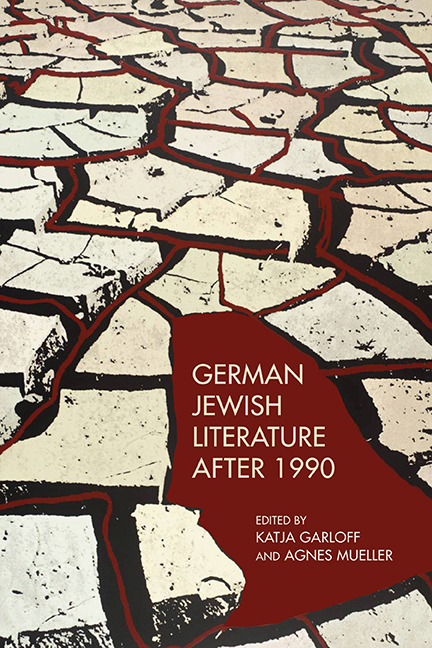Book contents
- Frontmatter
- Contents
- Acknowledgments
- Introduction
- I Self-Reflection in First- and Second-Generation Authors
- II Multiple Identities and Diversification of Holocaust Memory
- 4 The German Jewish Migrant Novel after 1990: Politics of Memory and Multidirectional Writing
- 5 Beyond Negative Symbiosis: The Displacement of Holocaust Trauma and Memory in Alina Bronksy's Scherbenpark and Olga Grjasnowa's Der Russe ist einer, der Birken liebt
- 6 Memory without Borders? Migrant Identity and the Legacy of the Holocaust in Olga Grjasnowa's Der Russe ist einer, der Birken liebt
- 7 Multilingualism and Jewishness in Katja Petrowskaja's Vielleicht Esther
- III New Themes and Directions in Recent German Jewish Literature
- IV Coda: Interviews with Two Contemporary German Jewish Writers
- Bibliography
- Notes on the Contributors
- Index
6 - Memory without Borders? Migrant Identity and the Legacy of the Holocaust in Olga Grjasnowa's Der Russe ist einer, der Birken liebt
from II - Multiple Identities and Diversification of Holocaust Memory
Published online by Cambridge University Press: 07 September 2018
- Frontmatter
- Contents
- Acknowledgments
- Introduction
- I Self-Reflection in First- and Second-Generation Authors
- II Multiple Identities and Diversification of Holocaust Memory
- 4 The German Jewish Migrant Novel after 1990: Politics of Memory and Multidirectional Writing
- 5 Beyond Negative Symbiosis: The Displacement of Holocaust Trauma and Memory in Alina Bronksy's Scherbenpark and Olga Grjasnowa's Der Russe ist einer, der Birken liebt
- 6 Memory without Borders? Migrant Identity and the Legacy of the Holocaust in Olga Grjasnowa's Der Russe ist einer, der Birken liebt
- 7 Multilingualism and Jewishness in Katja Petrowskaja's Vielleicht Esther
- III New Themes and Directions in Recent German Jewish Literature
- IV Coda: Interviews with Two Contemporary German Jewish Writers
- Bibliography
- Notes on the Contributors
- Index
Summary
THE WISH TO NO LONGER SEE the Holocaust as the defining reference point for Jewish identity or for German identity, or for relations between Germans and Jews; a wish to no longer think in terms of national categories or “binary oppositions” (i.e., of Germans and Jews, of victims and perpetrators)—these wishes can often reveal the continued structuring power of that very trauma, of those very categories. Recent scholarly studies assert that Holocaust memory has been transformed, and not only in Germany, through factors including generational shifts; the collapse of Communism and the end of the Cold War; economic and cultural globalization; European integration and expansion; migration and the development of ethnically and religiously diverse and complex societies (to avoid the now controversial term “multicultural”); and the emergence of new cosmopolitan identities. In cultural studies, Michael Rothberg's popular notion of “multidirectional memory” is now frequently invoked as a conceptual model with which to interpret literary narratives or artworks, especially contemporary works that reflect the above-referenced historical dynamics and which feature a prominent transnational or transcultural focus and which are produced by artists with migrant backgrounds, in order to argue that these works reflect a de-centering of the Holocaust in contemporary German-language culture (or in world culture) and an undermining of the aforementioned “binaries.”
Olga Grjasnowa's debut novel of 2012, Der Russe ist einer, der Birken liebt (All Russians Love Birch Trees, 2014) is one such work which has already been interpreted by critics along these lines. The novel is the firstperson narrative of Mascha Kogan, a protagonist who shares many features of Olga Grjasnowa's own biography. Mascha is born in 1984 in Baku, Azerbaijan, to a Russian father and a Jewish mother. Her parents take her to Germany at the age of eleven, fleeing the hypernationalism and bloody ethnic clashes between Armenians and Azerbaijani Turks (Azeris) in the mid-1990s, which in Baku led to pogroms, massacres, and the expulsion of Armenians. The novel juxtaposes Mascha's personal traumas with multiple historical traumas as the narrative moves between Azerbaijan, Germany, Israel, and Palestine. In contrast to readings by critics that see (and perhaps also celebrate) in Grjasnowa's text a subversion of received national categories and habits of Holocaust memory in favor of a “multidirectional” memory, my reading will illustrate ways in which Grjasnowa subtly reveals the persistent and structuring national context of memory.
- Type
- Chapter
- Information
- German Jewish Literature after 1990 , pp. 123 - 145Publisher: Boydell & BrewerPrint publication year: 2018
- 2
- Cited by



